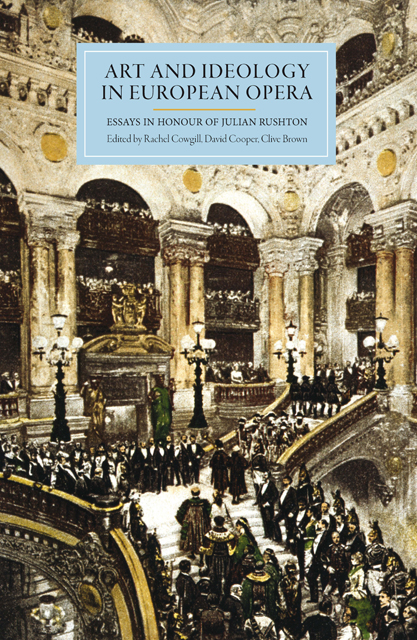Book contents
- Frontmatter
- Contents
- List of Figures
- List of Music Examples
- List of Tables
- Notes on Editors and Contributors
- Acknowledgements
- Introduction
- I Nationalism, Cosmopolitanism and National Opera
- II Opera, Class and the Politics of Enlightenment
- III Opera and Otherness
- Julian Rushton: A Family Memoir
- 7 The Works of Julian Rushton
- Index
- Tabula Gratulatoria
3 - Funding Grand Opera in Regional France: Ideologies of the Mid-Nineteenth Century
Published online by Cambridge University Press: 28 February 2023
- Frontmatter
- Contents
- List of Figures
- List of Music Examples
- List of Tables
- Notes on Editors and Contributors
- Acknowledgements
- Introduction
- I Nationalism, Cosmopolitanism and National Opera
- II Opera, Class and the Politics of Enlightenment
- III Opera and Otherness
- Julian Rushton: A Family Memoir
- 7 The Works of Julian Rushton
- Index
- Tabula Gratulatoria
Summary
Should a commercially unviable art form be subsidized with public money? Or should it be for market forces to decide its future? In an environment where private patronage of the arts was rare, that was the central, destabilizing dilemma provoked by moves toward deregulated theatre – spoken and lyric alike – across mid-nineteenth-century France. Composers and playwrights, and their professional associations, had long clamoured for just such a ‘ liberte des theatres’, in which anyone wealthy and in good standing could set up a theatre, and theatre managers could put on whatever repertory they chose. After an unsuccessful attempt amid the revolutionary fervour of 1848/9 it was, ironically, during a conservative imperial regime that they finally achieved their goal: on 6 January 1864 Napoleon III promulgated a decree deregulating the theatre industry nationwide1 – from 1 July of that same year the nature of French theatrical entrepreneurship would change fundamentally. This essay explores the hotly debated question of what form of deregulation was most appropriate to the regions, where operatic provision before 1864 was widespread but beleaguered, and where the challenges of funding grand opera, though in some ways similar to those of Paris, rested on a radically different infrastructural basis. In so doing it provides a context for the sea change of 1864 and helps to explain why the one-size legislation of the ‘liberte’, although conceived after consultation with regional préfets, essentially failed the operatic constituency it was intended, among others, to help.
French Opera Systems
To understand the ramifications of the 1864 legislation we must scroll back briefly to the aftermath of the Revolution. The first ‘liberte des theatres’, of 1791, had brought belated but not unproblematic freedom from ancien régime systems of royal privilege. In 1806 and 1807 Napoleon I repealed it. To maintain State control over the performing arts, to ensure the purity of French theatrical genres, and to keep a close eye on public order, he drastically reduced the number of theatres allowed in each urban area of France, and rendered every French theatre manager a State licensee with a cahier des charges [contract] that specified his artistic duties and his financial conditions of operation.
- Type
- Chapter
- Information
- Art and Ideology in European OperaEssays in Honour of Julian Rushton, pp. 67 - 84Publisher: Boydell & BrewerPrint publication year: 2010



